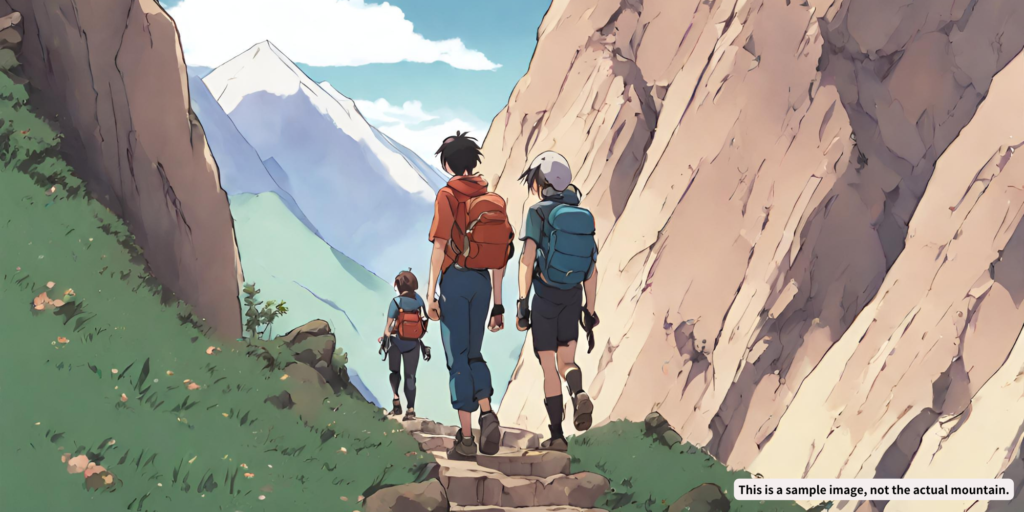
Embarking on a climbing adventure in Japan is not just about conquering peaks; it’s about immersing oneself in a culture that reveres nature and respects the bond between climbers. This guide delves into the specific etiquettes that safeguard the stunning environments and ensure a fulfilling experience for all. From the heartfelt exchange of greetings to the principles of leaving no trace, these practices, some unique to Japan and others universally acknowledged, illuminate the path to harmonious coexistence with nature and fellow adventurers.
1. Greetings: The Heart of Climbing Etiquette
It's customary in Japan to warmly greet other climbers you meet along your path. A cheerful "Konnichiwa (Hello)," is more than just a greeting—it's a bridge of camaraderie. This simple yet profound exchange fosters a sense of unity among climbers and can even open the door to vital exchanges of safety information.
2. Leave No Trace
Preserving the pristine nature of Japan’s outdoors hinges on one crucial principle: carry out all your trash. With few to no trash bins available on many trails, climbers must take responsibility for their waste, including food scraps, disposable utensils, and even toilet paper. Adopting a leave-no-trace ethic ensures the beauty of the trails for those who follow.
3. Embrace the Silence
The tranquility of Japan's natural settings is something to be cherished. Loud conversations or blasting music not only detracts from the experience but can also disturb the peace of others. The quietude of the wilderness offers a rare escape from the bustle of urban life, inviting climbers to immerse themselves in the serene embrace of nature.
4. Uphill Has the Right of Way
Navigating Japan's trails comes with its own set of unwritten rules, particularly on narrower paths where ascending hikers have the right of way. Climbing uphill demands more effort, so it's courteous for those descending to step aside. Hiking in groups? Keep to a single file and avoid blocking the path, ensuring everyone can enjoy their journey unimpeded.
5. Honor the Natural Habitat
The diverse flora and fauna make Japan's mountains special. Picking plants or feeding wildlife disrupts the delicate balance of these ecosystems. A respectful attitude towards nature's inhabitants underscores the importance of preserving these habitats for future generations to enjoy.
6. Communicate Your Climb
Sharing your climbing plans with family or friends isn't just thoughtful—it's a safety net. Given the unpredictable weather and complex trail networks in Japan, informing someone of your route, destination, and expected return time is a vital precaution. Should anything unexpected occur, help can be mobilized swiftly.
7. The Mountain Climbing Registration
Filing a mountain climbing registration (登山届/tozan todoke) before setting out is not merely procedural; it's a cornerstone of safety in the Japanese mountains. This document, outlining your route and contact details, is instrumental for quick rescue operations if needed. The advent of online submissions has simplified this process, underscoring the commitment to safety for oneself and the broader climbing community.
8. Stick to the Path
Wandering off the trails in Japan can lead you into a maze of confusion, and in certain areas, just a small detour can spell the danger of slips or falls. But the risk isn't just personal; stepping off the path can harm the surrounding vegetation and lead to soil erosion. It's imperative to respect the laid-out routes and steer clear of untouched wilderness. By staying on the trail, you not only safeguard your well-being but also play a part in conserving the exquisite natural beauty for those who will follow in your footsteps.
9. Preparedness for the Unpredictable
Equipping yourself with emergency contacts and maintaining communication means, like a fully charged phone or a satellite phone, is crucial. Japan boasts a robust mountain rescue infrastructure ready to assist in emergencies, emphasizing the importance of being prepared.
10. Post-Climb Considerations
The adventure doesn't end once you descend. The hot springs, eateries, and local amenities that welcome climbers are part of the experience. Acting with respect and mindfulness towards local customs enriches the journey, leaving a positive imprint on the land and its inhabitants.
To Wrap It Up
As we ascend through Japan's majestic landscapes, adhering to these tenets of climbing etiquette does more than just preserve the beauty and tranquility of the wilderness; it enriches our journey, fostering a deeper connection with the environment and those we meet along the way. By embracing these guidelines, climbers can contribute to a culture of respect and safety that transcends borders, ensuring that the majestic peaks and serene forests of Japan remain pristine for generations to come. Whether you're soaking in the hot springs post-climb or sharing tales of your ascent, remember that the spirit of your adventure is shaped by the respect and mindfulness you carry with you, leaving a lasting impact on both the land and its people.
*Before heading out on a hike, make sure to stay updated with the latest information on trails and other important details.


